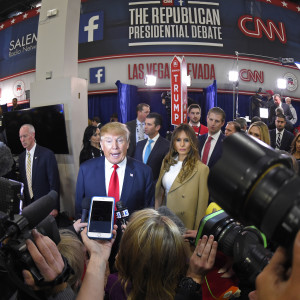Republican presidential candidates Carly Fiorina, Gov. John Kasich and Donald Trump debated different strategies for dealing with terrorists’ purported use of encrypted communications during Tuesday night’s Republican debate on CNN.
The issue has risen in prominence on Capitol Hill since investigators alleged Islamic State-inspired attackers in Paris and San Bernardino used encryption to plan their assaults. The question of whether companies providing those services should be forced to work with intelligence and law enforcement spilled over onto the 2016 GOP debate stage in Las Vegas.
“They do not need to be forced,” Fiorina said. “They need to be asked to bring the best and brightest, the most recent technology to the table.”
“I was asked as a CEO, I complied happily, and they will as well,” the former HP CEO said, referencing her time as the chair of a CIA civilian tech advisory board during the last Bush administration. “But they have not been asked.”
Trump took a more aggressive stance, and repeated a headline grabbing statement from earlier this month that he’s open to restricting portions of the Internet to undermine the threat of terrorists communicating and radicalizing online.
“We should be able to penetrate the Internet and find out exactly where ISIS is and everything about ISIS, and we can do that if we use our good people,” the business mogul said. “I would certainly be open to closing areas where we are at war with somebody. I sure as hell don’t want to let people that want to kill us, and kill our nation, use our Internet.”
Trump previously said he would turn to Bill Gates and other leaders in the tech community for advice on “closing that Internet up in some ways” to deal with encryption and the spread of ISIS propaganda on social media.
Kasich took his own hardline stance, and advocated compelling technology companies to decrypt data and produce it at the behest of agencies including the FBI.
“There is a big problem, its called encryption,” the Ohio governor said, adding San Bernardino suspects Tashfeen Malik and Syed Farook were able to plan their assault by using encrypted devices — a claim that has yet to be substantiated by investigators.
ABC, CBS, the International Business Times and Fox all reported earlier this week the attackers used devices “with some form of encryption,” citing unidentified senior U.S. officials.
Cybersecurity experts were quick to describe the claim as vague at best, and pointed out virtually every contemporary device with mobile connectivity features some level of basic encryption by default, without which users would routinely have sensitive data intercepted and stolen in transmission.
“We have to solve the encryption problem; it is not easy,” Kasich continued. “We need to be able to penetrate these people when they are involved in these plots and these plans, and we have to give the local authorities the ability to penetrate, to disrupt.”
“Encryption is a major problem and Congress has got to deal with this, and so does the president to keep us safe.”
Following an address from President Obama that touched on the issue last week, the White House recently announced it’s reweighing its stance on encryption, with a policy decision pending in the coming weeks.

